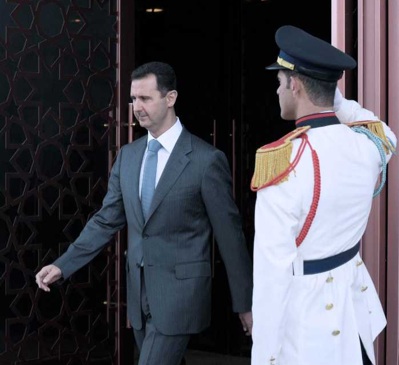ISTANBUL (TURKISH JOURNAL) – By Janet Ekstract – The date has long passed to wonder when Bashar al-Assad’s regime will end the decade-long war in Syria. As the Syrian conflict reached the decade mark, major world powers called on the regime to end the killing and work toward a political solution based on the previous United Nations resolution.
Germany, France, the U.S. and the UK issued a joint statement stating that: “A nationwide ceasefire must be established,” as well as demanding Assad’s regime adhere to the UN Security Council’s roadmap to peace for Syria. Part of what the statement said is to: “stop the ruthless killing and engage meaningfully in all aspects of UNSCR 2254 including a nationwide ceasefire, a reformed constitution, release of arbitrarily detained persons, as well as free and fair elections.”
The four powers condemned what they termed as Assad’s “reckless military offensive” that includes Russia and Iran in Idlib in northwest Syria which the four countries said has only resulted in extreme suffering and a humanitarian crisis that is unprecedented in its scope. The Idlib offensive which began in December has taken a gargantuan toll on medical and humanitarian infrastructure in addition to the widespread displacement of hundreds of thousands of Syrians.
The world powers further stated: “We will continue to demand accontabliltiy for the atrocities committed by the Assad regime and we will continue our efforts to make sure that those who are responsible for crimes against humanity, war ccrimes, and other violations and abuses are identified and held accountable.” They also encouraged the international community to continue providing assistance to Syria’s neighbors to offset the costs of Syria’s refugee crisis.
Meanwhile, UN Special Envoy for Syria, Geir O. Pedersen in a note to correspondents stated: “The suffering of the Syrian people during this tragic and terrible decade still defies comprehension and belief.” Pedersen pointed out the “monumental scale” of human rights abuses, crimes, destruction and destitution that have occured on such a widespread scale in Syria. He referred to the nearly one million displaced populace from the Idlib region and reiterated that the “tragedy is deepening.”
Pedersen further stated: “The fate of the Syrian people is precariously and inevitably linked to the broader region and the international community. The horrific and enduring nature of the conflict is proof of a collective failure of diplomacy. Unprecedented levels of diplomatic cooperation and fortitude are needed to bring an end to this conflict. The parties must meaningfully engage in negotiations. The international community must demonstrate a renewed sense of urgency in supporting the Syrians in finding a UN-facilitated political solution as set out in Security Concil resolution 2254 (2015) – the only framework that enjoys legitimacy and support of the entire international community.”
Special envoy Pederson stressed that “the suffering of Syrians is catastrophic and must end.” He emphasized that the entire international community must unify around this issue and help the Syrians to achieve peace by getting involved in the process of calling for a political solution.
Idlib is within a de-escalation zone that was created in a deal between Turkey and Russia toward the end of 2018. The agreement called for the zone to be a protected area for Syrian refugees that would be overseen by both countries but the Syrian regime and its allies have continued to violate the agreement that called for a ceasefire along that zone. Because of the frequent attacks launched within the de-escalation zone, thousands upon thousands of Syrians have either lost their lives, suffered serious injury or been forced to flee in a mass exodus to the nearest border.
The latest ceasefire agreed upon by Turkish President Tayyip Erdogan and his counterpart Vladimir Putin took place after four days of talks in Ankara according to Turkey’s Defense Minister Hulusi Akar. Akar said that patrols on one of Syria’s key highways began on Sunday. The two nations agreed on March 5 that they would stop fighting in the Idlib region and will cooperate on a joint patrol on the M4 highway that connects the east and west of Syria. Turkey and Russia also agreed to create a security corridor on both sides of the highway.
On Tuesday, a Russian delegation arrived in Ankara to hammer out the details. Akar said: “The text that was prepared was signed by both sides and is now in effect. We will see its first application with the joint patrols on March 15.” The defense minister added that Turkey and Russia are working in tandem to make sure the ceasefire becomes a permanent one. They also plan on creating joint coordination centers to monitor the agreement. So far, the ceasefire continues but a Turkish security official speaking at a briefing in Ankara, confirmed that Turkey’s observation posts in Idlib would stay put and function in spite of being surrounded by Syrian regime forces. The official added: “There are no violations [of the ceasefire] against observation posts,” which the official said are to “end the bloodshed and humanitarian drama.” Turkey’s Defense Minister Akar said there are signs that migration fro Idlib toward Turkish borders has stopped since the ceasefire deal.




